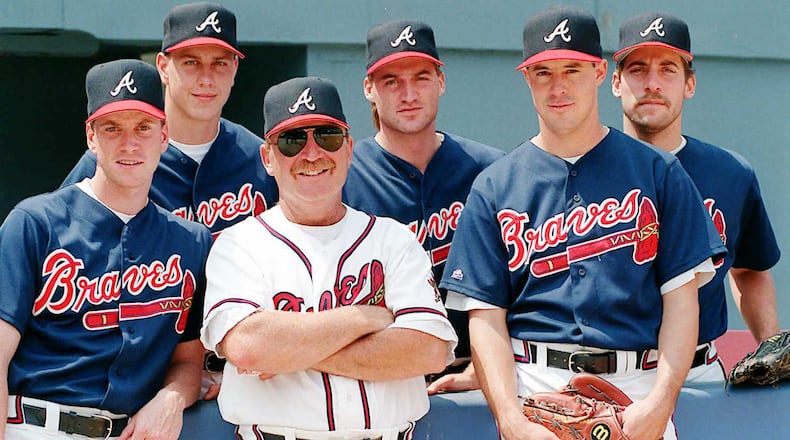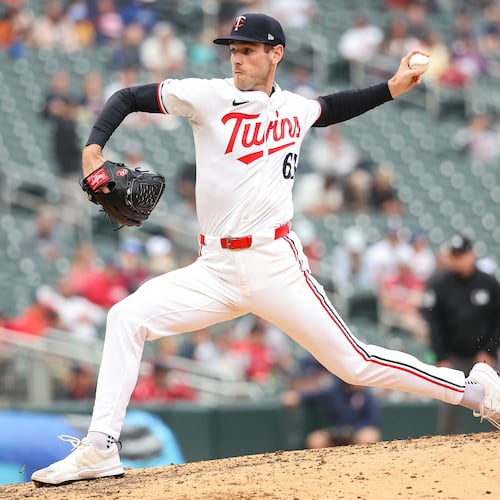Editor's note: The Atlanta Journal-Constitution will spend the year looking back at the 25th anniversary of the 1995 World Series champion Atlanta Braves. In a season-long series that will run through October, we will capture all the key moments and hear from the participants as they share their memories. Today's installment focuses on Leo Mazzone, the pitching coach of the '95 championship team.
Leo Mazzone is revered as one of baseball’s great pitching sages because of the many nights he spent barbecuing ribs, smacking on cornbread and sipping vodka in Johnny Sain’s RV.
Mazzone was the Braves’ pitching coach from 1990-2005, cementing his legacy across one of professional sports’ most impressive runs. He had been in the organization since 1979 and took on a greater role under then-general manager Bobby Cox in 1986.
Four years later, when Cox appointed himself manager, Mazzone was elevated to join his staff. In the seasons that followed, the Braves would assemble a pitching staff that featured Greg Maddux, Tom Glavine and John Smoltz. The trio is considered one of the best groups assembled, if not the best.
The Braves won 14 consecutive division titles from 1991-2005. Their only World Series championship came in the 1995 season, when they emerged from a truncated regular season with a 90-54 record – best in the National League – and ripped through the Rockies (3-1), Reds (4-0) and Indians (4-2) to secure a title.
“That time of my life was the greatest time in my life,” Mazzone said. “The people in my life, the players, coaches, front office, it just doesn’t get any better than that. And with that chain of command, you just knew it wasn’t going to be broken. You had (owner) Ted (Turner), then (president) Stan Kasten, (general manager) John Schuerholz, Bobby Cox. You had Paul Snyder and Hank Aaron running the farm system. You had great, great scouts. It doesn’t get any better than that.”
Mazzone’s pitching ensemble was magnificent in the championship season. In the 144-game slate, the Braves led baseball with a collective 3.44 ERA. Their FIP (fielding independent pitching) also topped the majors (3.58) by a sizable margin.
The Braves’ regular five-man rotation started 141 of the games that season, with Jason Schmidt starting two and Matt Murray the other. Smoltz, Glavine and Steve Avery each started 29 games. Maddux logged 28, while Kent Mercker had 26.
Maddux won the NL Cy Young award with a 1.63 ERA and 181:23 strikeout-to-walk ratio across 209-2/3 innings. It was his fourth consecutive Cy Young and final of his career.
Glavine finished third in the voting with a 3.08 ERA and 127:66 ratio in 198-2/3 innings. The southpaw would go on to win World Series MVP honors, stifling the Indians – and the most potent lineup the Braves faced during their run, according to Mazzone – allowing only two runs across 14 innings (two starts), including eight scoreless innings in the Braves’ clinching win.
The championship, five league pennants and 14 division titles are always traced to the rotation. The Braves had formidable hitters during that stretch – the offense was built around Hall of Famer Chipper Jones for much of it – but the conversation always circled back to Maddux, Glavine and Smoltz.
Mazzone is credited with much of Glavine’s and Smoltz’s development. He remembers a young Glavine having trouble with left-handed hitters. He recalls the southpaw cleaning up his mechanics and more confidently delivering the change-up to those left-handed hitters. Glavine was, as Mazzone remembers, “stubborn in a good way. He was a stoic, non-emotional figure out there.”
Smoltz’s development, however, might’ve been Mazzone’s signature achievement. In August 1987, Cox acquired Smoltz from the Tigers for Doyle Alexander – a trade now remembered as the best in team history – and Mazzone was given the task of “fixing” him.
By that point, Cox already trusted Mazzone’s pitching acumen. After taking over as GM, Cox declared he wanted to change the Braves from an offense-oriented organization to a pitching-oriented one. He wasted little time before asking who wanted to “take care of these pitchers” in a meeting. Mazzone eagerly raised his hand.
“That’s when I started feeling important in the organization,” Mazzone said. “Because Bobby came in and made it that way. He had the most influence on my life than any man I ever met, except my father. That’s about as well as I can say it. He’s meant so much to me.
“He gave me the opportunity to get there. He gave me the opportunity to implement programs in the minor leagues. He’s the first man in the game who ever made me feel important. Not only me, but everyone who played for him and coached for him, they felt important.”
Cox’s trust was rewarded when Smoltz was molded into a Hall of Famer under Mazzone’s guidance. Within two seasons, the erratic minor leaguer was a major-league All-Star (1989). The development began immediately after Cox added Smoltz to the system.
The story, as Mazzone remembers it:
“Bobby told me to take Smoltz down to the instructional league and stay with him 1-on-1. He said, ‘We made a trade for this guy. He has a good fastball, but he has no control and nothing to go with it.’ I said, ‘OK.’
“So we (Mazzone and Smoltz) are down in the bullpen, and after about four pitches in my first session with him, he said, ‘That ain’t right. That ain’t right.’ I said, ‘What do you mean that’s not right? I haven’t said anything yet.’ He said, ‘Well, in Detroit they said … (he was cut off).’ I said, ‘That’s (expletive). I don’t care what you did in Detroit. You’re in Atlanta now. Quit worrying about your front side. Do me a favor and throw the ball the best way you know how.’”
“He threw the ball the best way he knew how, and it was a beauty delivery. ‘That’s it. That’ll do.’ He didn’t believe me. He thought I was BS’ing him. I said, ‘John, that’s it.’ He said, ‘Oh, come on.’ I told him to do his natural delivery and not think about his mechanics.”
Smoltz grew more comfortable. Mazzone taught him Sain’s breaking-ball theories. He was built up for five innings. Cox doubted Smoltz could’ve made so much progress in such little time, so Mazzone invited him to see Smoltz pitch in a game.
The future Hall of Famer struck out eight and walked one in five innings with his future long-time manager in attendance.
“How in the hell did you do that?” Mazzone remembered Cox asking. “I said, ‘I let him be himself.’”
Oh, and then there was Maddux, who was already a multiple Cy Young winner before joining the Braves. And while his greatest years came in Atlanta, Mazzone won’t take any credit for that one. In fact, he insists it was more the teacher learning from the student.
“When I saw him walking out the door for the last time – I knew he wasn’t coming back (Maddux was a free agent in 2003) – I said, ‘Hey Mad Dog, you taught me more than I taught you.’
“He said, ‘Yeah, but you know, Leo, you gave me some great tips.’”
When Mazzone looks back on his career, one that’s earned him recognition as one of the top assistant coaches in sports history, he points to two turning points. The first is when Aaron and Snyder believed in him and hired him to be part of the Braves. He thanks them not only for that, but for giving him the freedom to groom pitchers his own way.
The second: Meeting Sain, who was regarded as a pitching guru long before Mazzone was on the map. A former Boston Brave, Sain coached for six franchises and was viewed as baseball’s premier pitching instructor. The final two years of his coaching career were with the Braves in 1985-86.
Mazzone always admired Sain. He was constantly trying to pick his brain for information during spring training. When Sain saw Mazzone’s curiosity and enthusiasm, he invited him to after-hours pitching conferences at his spring training home: a nearby RV.
Credit: MARLENE KARAS
Credit: MARLENE KARAS
“I studied the history of the game, and nobody had more success with pitchers than Johnny Sain,” Mazzone said. “He had the most brilliant pitching mind of anybody I met in my entire life. And I met a lot of baseball people in my life. So he’d fix a little cornbread, barbecue some ribs or whatever, we’d sip on some vodka and we’d talk pitching all night.”
During those meetings, Mazzone further developed the philosophies that would define his career. One integral takeaway was learning how to manage pitchers between starts, which helped keep his pitchers healthy. He felt that track record was one reason Cox so quickly trusted him.
“Meeting Sain over that run, it allowed me to realize it’s about what you do between starts,” Mazzone said. “The amount of effort you use to throw pitches between starts, the importance of changing speeds and the importance of being sneaky quick over being overpowering. In other words, it was often about less exertion.”
Mazzone, for his expertise, longevity and continuous rocking in the dugout, is one of the more recognizable figures from the Braves’ heyday. He oversaw a pitching staff that helped the Braves to five World Series appearances in the decade.
And yes, they won only one. But as Mazzone reminds: “The other teams we were playing were pretty good, too.”
It did make 1995 that much sweeter. A season that almost began with replacement players ended with Atlanta’s first championship. It was the franchise’s highest point. It gave Mazzone, Cox, Maddux, Glavine, Smoltz, Jones and so many others their only ring.
While sports was sidelined because of the coronavirus pandemic, Fox Sports Southeast replayed the 1995 World Series in May. It wasn’t Mazzone’s first time revisiting the games, but it was the first time in a while. Despite the benefit of foresight, he couldn’t help but get worked up in pressure moments.
“My wife heard me and asked why I was yelling,” Mazzone recalled. “I said, ‘We had an opportunity to score a run there. I’m getting nervous all over again.’”
» About the series
» FURMAN BISHER: Atlanta's finest moment
» SPRING TRAINING: Starting with replacement players
» MARK BRADLEY: A subdued season, a giddy ending
» BOBBY COX: The best manager we'll ever see
» BUILDING THE BRAVES: How the championship team was built
» CHIPPER JONES: 'No bigger beneficiary of '94 strike than me'
» GREG MADDUX: Mental master at his best during '95 season
» JOHN SMOLTZ: No Game 7, but one heck of a dogpile
» ANNOUNCERS: Championship call years in the making
» DAVE SHOTKOSKI: Remembering pitcher killed in spring training
» MARQUIS GRISSOM: Dream comes true for Atlanta native
About the Author
Keep Reading
The Latest
Featured





